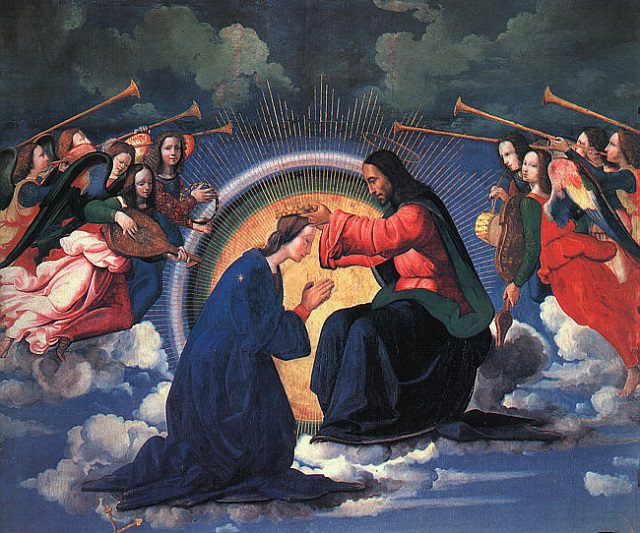
Detail of The Coronation of the Virgin with Six Saints (1504), by Ridolfo del Ghirlandaio (1483-1561) [public domain / Wikimedia Commons]
***
[originally published at Catholic365.com. As of 6-3-16, after 13 months, it had been shared 6,900 times on Facebook]
***
St. Louis Marie de Montfort (one of the giants in the history of Catholic Marian devotion) wrote:
We never give more honour to Jesus than when we honour his Mother, and we honour her simply and solely to honour him all the more perfectly. We go to her only as a way leading to the goal we seek — Jesus, her Son.
Catholics think in terms of “both/and” rather than making false and unnecessary dichotomies (“either/or”). This is also the Hebrew and biblical outlook. Doing Jesus’ will honors Jesus; so does honoring His mother, which (as it says above) is always intended as primarily honor and glory to the Son, Who made His very mother, as He willed.
Honoring His mother is honoring Him, in Catholic / biblical both/and thinking. The problem in many forms of Protestant thinking is persistent false dichotomies. Honor of anyone besides God is regarded as detracting from His honor and necessarily idolatry. Catholics recognize distinctions between adoration and veneration, and also follow the notion of worshiping God through His creation. Thus, St. Paul writes:
Romans 1:20 (RSV) Ever since the creation of the world his invisible nature, namely, his eternal power and deity, has been clearly perceived in the things that have been made. . . .
Analogously, we can say, “Jesus’ eternal power and deity, has been clearly perceived in the things [in this instance, Mary] that have been made.” That’s both/and thinking.
Stating “we never give more honor” is not saying that it is the highest or only form of honoring Christ; only that no other form could give more honor. Technically, then, one could also say, in line with the meme, that “we never give more honor to Christ than simply do what He says.” They could both be on the highest level. And indeed they are! Moreover, the saint makes the following equation: “we honour her simply and solely to honour him.”
The biblical motif of imitating holy people is similar to veneration (see: Rom 11:14; 1 Cor 4:15-16; 11:1-2; Phil 3:17; 4:9; 1 Thess 1:6-7; 2:9-14; 3:7-9; 1 Tim 4:12; 2 Tim 3:10-14; Heb 6:12; 13:7; Jas 5:10-11; 1 Pet 3:1-2; 5:2-3).
St. Paul makes it clear more than once that imitating him is in complete harmony with the notion of imitating Christ, whom Paul is imitating (see, e.g., Ephesians 5:1: “Therefore be imitators of God, as beloved children:): “Be imitators of me, as I am of Christ” (1 Cor 11:1); “And you became imitators of us and of the Lord . . .” (1 Thess 1:6). It’s not either/or.
By analogy, it is altogether proper to venerate and honor saints, who have more perfectly attained God’s likeness (Matt 22:30; 1 Cor 13:9-12; 2 Cor 3:18; Phil 3:21; Heb 11:40; 1 Jn 3:2; Rev 21:27; 22:14), in light of the example of how “heroes of the faith” are regarded (Hebrews 11) and also the biblical injunctions to honor all sorts of people:
1) All men (Rom 12:10; 1 Cor 12:23-26; 1 Pet 2:17).
2) The emperor (1 Pet 2:17).
3) Government authorities (Rom 13:6-7).
4) Fathers and mothers (Ex 20:12; Dt 5:16; Eph 6:2).
5) Widows (1 Tim 5:3).
6) Elders, preachers, and teachers in the Church (1 Tim 5:17).
7) Wives (1 Pet 3:7; cf. Gen 30:20).
King Asa was honored after his death:
2 Chronicles 16:14 They buried him in the tomb which he had hewn out for himself in the city of David. They laid him on a bier which had been filled with various kinds of spices prepared by the perfumer’s art; and they made a very great fire in his honor. (cf. 21:19, showing that this was a general practice)
King Hezekiah was also so honored:
2 Chronicles 32:33 And Hezeki’ah slept with his fathers, and they buried him in the ascent of the tombs of the sons of David; and all Judah and the inhabitants of Jerusalem did him honor at his death.
There are many more examples in the Bible of veneration of both men and angels (often as direct representatives of God):
Genesis 18:1-4, 22 And the LORD appeared to him by the oaks of Mamre, as he sat at the door of his tent in the heat of the day. [2] He lifted up his eyes and looked, and behold, three men stood in front of him. When he saw them, he ran from the tent door to meet them, and bowed himself [shachah] to the earth, [3] and said, “My lord, if I have found favor in your sight, do not pass by your servant. [4] Let a little water be brought, and wash your feet, and rest yourselves under the tree, . . . [22] So the men turned from there, and went toward Sodom; but Abraham still stood before the LORD.
The text in-between goes back and forth, referring to “men” or “they” or “them” (18:9, 16) and “The LORD” or first-person address from God (18:10, 13-14, 17-21) interchangeably, for the same phenomenon and personal / physical / verbal encounter.
Joshua 5:13-15 When Joshua was by Jericho, he lifted up his eyes and looked, and behold, a man stood before him with his drawn sword in his hand; and Joshua went to him and said to him, “Are you for us, or for our adversaries?” [14] And he said, “No; but as commander of the army of the LORD I have now come.” And Joshua fell on his face to the earth, and worshiped [shachah], and said to him, “What does my lord bid his servant?” [15] And the commander of the LORD’s army said to Joshua, “Put off your shoes from your feet; for the place where you stand is holy.” And Joshua did so.
A “man” is equated with God also in Genesis 32:24, 30. The Angel of the Lord is sometimes referred to as God Himself, but not always; and is venerated. So, for example:
Judges 13:15-22 Mano’ah said to the angel of the LORD, “Pray, let us detain you, and prepare a kid for you.” [16] And the angel of the LORD said to Mano’ah, “If you detain me, I will not eat of your food; but if you make ready a burnt offering, then offer it to the LORD.” (For Mano’ah did not know that he was the angel of the LORD.) [17] And Mano’ah said to the angel of the LORD, “What is your name, so that, when your words come true, we may honor you?” [18] And the angel of the LORD said to him, “Why do you ask my name, seeing it is wonderful?” [19] So Mano’ah took the kid with the cereal offering, and offered it upon the rock to the LORD, to him who works wonders. [20] And when the flame went up toward heaven from the altar, the angel of the LORD ascended in the flame of the altar while Mano’ah and his wife looked on; and they fell on their faces to the ground. [21] The angel of the LORD appeared no more to Mano’ah and to his wife. Then Mano’ah knew that he was the angel of the LORD. [22] And Mano’ah said to his wife, “We shall surely die, for we have seen God.” (cf. 6:12-16, 20-23)
This passage is remarkable in that it goes back and forth between God (13:16, 19, 22) and the angel of the Lord (or of God) as His direct representative (13:15-18, 20-21 and in the larger passage, 13:3, 6, 9, 13). The angel is honored (v. 17), they fall on their faces to worship (v. 20) and at length the angel is equated with God as His visible manifestation (v. 22). But the difference between the angel and God is highlighted by the angel being described as a “man of God” (13:6, 8) and “the man” (13:10-11).
The angel of the Lord is also equated with God (theophany) in Gen 31:11-13; Jud 2:1; but differentiated from God as well, as a representative: (2 Sam 24:16; 1 Ki 19:6-7; 2 Ki 19:35; Dan 3:25, 28; 6:23; Zech 1:8-14).
The Bible, in summary, is quite clear: there is an occasional use of angels or men as direct representatives of God, and they are “worshiped” [i.e., venerated] only insofar as they represent God, as a visual image or object, through whom God is working and communicating. But veneration is strictly separated from the adoration due to God alone (see: Acts 10:25-26; Rom 1:25; Col 2:18; Rev 22:8-9). Everything has to be considered together, as a whole.
All of this explicit biblical evidence is precisely in line with what the Catholic Church teaches. It is the outright prohibition of all veneration and honor of creatures whatever that is a grossly unbiblical notion. Moreover, “worship” is used in a wider (literary) sense of showing reverence or obeisance to men of authority (in this instance, a king), in 1 Chronicles 29:20: “And David said to all the congregation, Now bless the LORD your God. And all the congregation blessed the LORD God of their fathers, and bowed down their heads, and worshipped [shachah] the LORD, and the king” (KJV). RSV has: “worshiped the LORD, and did obeisance to the king,” but it is one Hebrew word applied to both.
The Bible tells us to “honor all men” — so we think that the Mother of our Lord Jesus Christ, Who was God, is worthy of great honor: above all other creatures. And (as shown above), the ultimate and primary aim in honoring and venerating the Blessed Virgin Mary, is to worship and honor and adore her Son.
*****
Meta Description: Catholic apologist Dave Armstrong provides 50 biblical reasons for the veneration of Mary, and of Jesus through Mary.
Meta Keywords: Catholic Mariology, devotion to Mary, dulia, honoring Mary, hyperdulia, latria, Mariology, veneration of Mary, Veneration of saints, worship

















